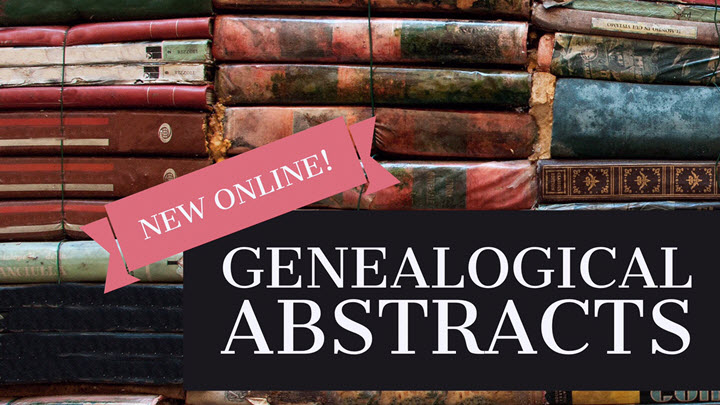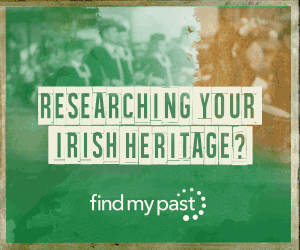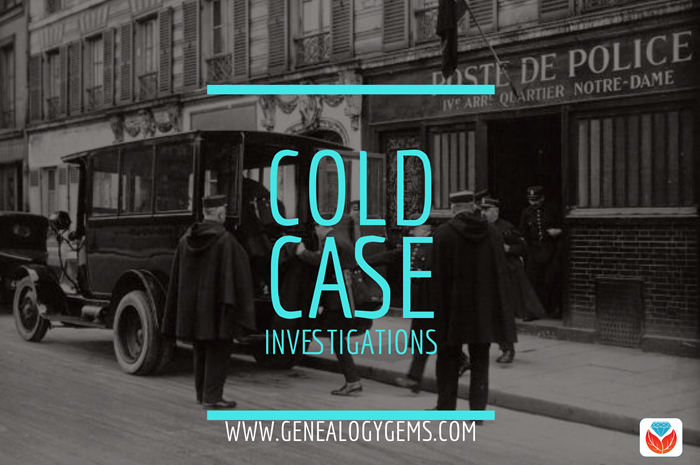by Lisa Cooke | Oct 27, 2017 | 01 What's New, Records & databases
Explore new Irish Genealogical Abstracts that have become available this week. They are a great alternative to records destroyed in the 1922 Dublin fire! Also new are church and burial records for England, poorhouse records for Scotland, German military recruitment, documents, and colonial letters for Australia. Finally, a variety of exciting collections are now online for the U.S. for Massachusetts, New Mexico, Georgia, and more!

Irish Genealogical Abstracts
New this week at Findmypast are several genealogical abstract collections! First is the Thrift Irish Genealogical Abstracts, created by renowned Irish genealogist Gertrude Thrift. This collection features copies of wills, bill books, parish registers, commission books, and freeman lists, as well as detailed family trees and pedigree charts. Records in this collection date as far back as the 16th century and up to the early 20th century.
Next is the Crossle Irish Genealogical Abstracts collection. Explore the various notebooks of 19th-century genealogists Dr. Francis Crossle and Philip Crossle to reveal a wealth of Irish genealogical resources including copies of records destroyed in the fire at the Public Record Office in Dublin in 1922.
Finally, the Betham Irish Genealogical Abstracts features abstracts and genealogical sketches created by herald Sir William Betham, the Ulster King of Arms. The notebooks are an excellent substitute for missing records and include abstracts of wills, reconstructed family trees, and detailed pedigrees.
Also new for Irish genealogy this week is the Cork, Pobble O’Keefe Census 1830-1852. Search these records to discover who your ancestor was living with as well as their occupation, birth year and marital status.
Findmypast is the leader in genealogical records for Ireland, the UK, and now including U.S. and Canada. Get a two-week free trial of their premium subscription and explore millions of Irish record and more! Click here to subscribe now.
England Parish Records
Extracted Church of England Parish Records, 1538-1837 for Nottingham, England are now available online at Ancestry.com. The records include baptisms/christenings, burials, marriages, tombstone inscriptions, obituaries, tax lists, wills, and other miscellaneous types of records.
Over 75,000 records have been added to Findmypast’s collection of Yorkshire Burials, covering Anglican parishes and municipal cemeteries. Find your ancestor’s name, age at death and burial place, with more than 4 million records covering over 400 years.
Scottish Poorhouse Records
New for Scotland are Kirkcaldy, Fife, Poorhouse Records, 1888-1912. This collection includes records for those who received help from the Abden Home Poor Law Institution, originally named the Kirkcaldy Combination Poorhouse.
German Military Records
 Halle(Saale), Military Recruitment Lists, 1828-1888 are now online at Ancestry.com.
Halle(Saale), Military Recruitment Lists, 1828-1888 are now online at Ancestry.com.
From the collection description: “These recruitment lists are arranged in chronological-alphabetical order and contain detailed information about male military personnel in the city. Typically records for young men begin at age 20. Therefore this collection includes age groupings for men born beginning in 1808 up to and including 1868.”
Australia – New South Wales
At Ancestry.com, you can now explore the New South Wales, Colonial Secretary’s Letters, 1826-1856 collection. If you had ancestors living there during that time period, you can find a wealth of information in this collection, including petitions by convicts for sentence mitigation, marriage permission requests, character memorials for potential settlers, land grant or lease applications, official visit reports, information about court cases, and lists of assigned servants.
United States – Maps & More
Confederate Maps. The Cartographic Branch of the National Archives has announced the digitization of over 100 Confederate maps from Record Group (RG) 109. All are now available to view or download through their online catalog. “These maps can include rough sketches created quickly before or during a battle, but can also include maps that were drawn to accompany official reports or even post-war publications. Many are highly detailed and colorized.”
Massachusetts. At AmericanAncestors.org (the website of the New England Historic Genealogical Society), 12 new volumes have been added to the parish of Immaculate Conception in Salem to Massachusetts collection, Roman Catholic Archdiocese of Boston Records, 1789-1900. This update consists of 23,972 records and roughly 90,300 names.
New Mexico. Bernalillo County, New Mexico, Marriage Index, 1888-2017 are now available online at Ancestry.com. The original records come from Bernalillo County Record’s Office, Albuquerque, New Mexico.
Georgia. From a recent press release: The Digital Library of Georgia (DLG) is celebrating its 1 millionth digitized historic newspaper page. The premier issue of the Georgia Gazette, Georgia’s first newspaper, published from 1763-1776 in Savannah, will become the 1 millionth page of historic newspapers to be made freely available online through the Georgia Historic Newspapers (GHN).
Colorado. Also celebrating a 1 million milestone is the Colorado Historic Newspapers Collection (CHNC), from the Colorado Virtual Library. The millionth page came from the Montrose Daily Press, Volume XII, Number 247, April 21, 1921, which is part of a digitization project supported by Montrose Regional Library District.
Disclosure: This post contains affiliate links and Genealogy Gems will be compensated if you make a purchase after clicking on these links (at no additional cost to you). Thank you for supporting the free Genealogy Gems podcast and blog!
by Lisa Cooke | Dec 9, 2013 | 01 What's New, Apps, Conferences, Mobile
 Originally designed specifically for the iPad in 2010, the free Flipboard app has moved onto all the major mobile platforms. And this cool new technology has just gotten better with a big dose of genealogy!
Originally designed specifically for the iPad in 2010, the free Flipboard app has moved onto all the major mobile platforms. And this cool new technology has just gotten better with a big dose of genealogy!
I invite you to explore the newly released free Flipboard magazine RootsTech 2014: Where Genealogy and Technology Converge.
Genealogy Gems has published the magazine in conjunction with the RootsTech program team in a continuing effort to help family historians embrace new technologies and present RootsTech attendees with the possibilities.
Consider what’s been happening in the mobile space this last year:
- Smartphone usage in the U.S. increased by 50 percent (Kleiner Perkins)
- The number of emails being opened on mobile increased by 330 percent (Litmus)
- Tablet usage doubled in the U.S. (Pew Research Center)
The bottom line: More than ever folks are accessing websites, videos, podcasts, blogs and other online information on their mobile devices. That’s where the free Flipboard app comes in.
The free Flipboard app is a social-network and online aggregator of web content and RSS channels for Android, Blackberry 10, iOS, Windows 8, and Windows Phone 8. Content is presented in a captivating magazine format allowing users to “flip” through it with a simple swipe of the finger.
As a genealogy new media content creator and publisher, we’re excited to introduce a creative use of this emerging technology to the genealogy industry. RootsTech 2014: Where Genealogy and Technology Converge is a free magazine available at http://tinyurl.com/RootsTech2014. The magazine pulls together great web content from RootsTech speakers, exhibitors, and official bloggers in one beautiful and convenient place.
This magazine has presented an opportunity to crowd-source the know-how and talent of all of those who work to make RootsTech a success. The magazine offers an exciting look at the RootsTech experience the innovative technologies emerging in the genealogy industry, and a new vehicle for everyone in the RootsTech community to converge! The pages go beyond text and images by also delivering video and audio!
How to Access the Magazine in Flipboard:
- Get the free Flipboard app at flipboard.com, in iTunes or Google Play.
- Set up for your free account
- In the search box at the top of the homepage, search for ROOTSTECH
- Tap “RootsTech 2014” by Lisa Louise Cooke (you’ll see a magazine icon next to it.)
- When the magazine loads, tap the SUBSCRIBE icon at the top of the page
- Starting at the right hand side of the page, swipe your finger from right to left over each page to “flip!”
Looking for more great genealogy themed Flipboard magazines? Check out two more new issues from Lisa Louise Cooke:
Stay tuned to the Genealogy Gems Blog and Podcast for Lisa’s upcoming exclusive interview with the folks at Flipboard!
by Lisa Cooke | Apr 30, 2014 | 01 What's New, Family Tree Magazine, Research Skills, Technology

We’ve all got genealogy brick walls in our research: family mysteries we have so far found unsolvable. In the new issue of Family Tree Magazine (May/June 2014), Lisa’s got a great article packed with 14 strategies for SOLVING those perplexing questions.
The article is “Warming Up a Cold Case,” and it’s got a fun criminal investigator theme. I won’t give all 14 of her tips away, but some of my favorites include re-examining old evidence, finding new witnesses and going on a genealogical stakeout. And one that made me laugh out loud: “Post wanted posters.” And then I just had to put my ancestor’s face on a wanted poster (right).
How do you really create a wanted poster for your ancestor? Lisa shares these ideas in the article:
1. Post their names on genealogy online message boards (like at Ancestry.com). But fill in those “wanted” details. Instead of height, weight and hair color, add what you know about their births, marriages, deaths, family relationships and residences.
2. Post your family tree online at any number of sites for free. Sites organize their trees in one of two ways. Ancestry.com, MyHeritage.com and others can i buy medication without insurance offer the individual tree model. You upload (or build on the site) and maintain your own tree. FamilySearch.org, WikiTree, Geni.com and WeRelate.org are community tree sites. You may work from a view of your own tree, but the site is merging your tree with others behind the scenes to create a single world family tree (each does this a slightly different way).
3. Start your own family history blog. Write keyword-rich blog posts that make it easy for Google searchers to find your ancestors there. Check out Lisa’s free four-part series on how to create a genealogy blog at the Genealogy Gems YouTube Channel. This link will take you to the 4 part video playlist.

Find the entire article in the May/June issue Family Tree Magazine. Even better: Genealogy Gems Premium Members can also watch Lisa’s one hour video class Brick Walls: Cold Case Investigative Techniques. Not a Premium Member yet? You’re missing out on 24/7 access for a year to some of her most popular classes on Google, Google Earth, organization, Evernote, newspaper research and more. Learn more about Genealogy Gems Premium Membership here.
by Lisa Cooke | Jul 17, 2015 | 01 What's New, British, Digital Archives, Findmypast, images, Newspaper

Every Friday, we blog about new genealogy records online. Do any collections below relate to your family history? Please share with genealogy buddies or societies that might be interested! This week: Midwestern U.S. newspapers (Cleveland, OH and Chicago, IL) and records of Pennsylvania coal and canal workers’ and English and Welsh criminals.
CLEVELAND JEWISH NEWS. Technically this isn’t new content, but access to the Cleveland Jewish News is newly free, so it’s new to most of us! You do need to provide your name and email address for free access to 125 years of Cleveland Jewish newspapers. Subscribers have immediate access to all content as it is published; the public can access materials 90 days after they go online.
CHICAGO TRIBUNE ARCHIVE. For a very limited time–during beta testing of its new archive–old issues of The Chicago Tribune are free to search on its Archives website. Click here for their FAQ page or read a more detailed report on the National Genealogical Society (US) blog.
ENGLAND & WALES REGISTER OF CRIMINAL PETITIONS. Findmypast added over 77,000 records to its Registers of Criminal Petitions index to imaged registers of correspondence relating to criminal petitions. Documents usually give the outcome of any appeal and registers note the place of imprisonment.
PENNSYLVANIA COAL AND CANAL WORKERS. Ancestry just posted employee cards and applications from the Lehigh Coal and Navigation Company for first half of the twentieth century. “The cards may list name, marital status, occupation, birth date, record date, residence, spouse, nationality, number of children and their ages, citizenship, date range for jobs, who to notify in case of an accident, and pension date. Applications can contain other details, including parents’ names, schooling, employment record, birthplace, and height and weight.”
 When searching digitized newspaper sites, remember that the search technology used (optical character recognition) is much less thorough for historical newspapers than modern text, especially for capitalized words. Use creative search terms if searches on an ancestor’s name aren’t productive, like the person’s occupation or death date. Click here to learn more about using Google to search digitized newspaper pages, or read Lisa Louise Cooke’s newly-revised and updated book The Genealogist’s Google Toolbox, available now both in print and e-book format.
When searching digitized newspaper sites, remember that the search technology used (optical character recognition) is much less thorough for historical newspapers than modern text, especially for capitalized words. Use creative search terms if searches on an ancestor’s name aren’t productive, like the person’s occupation or death date. Click here to learn more about using Google to search digitized newspaper pages, or read Lisa Louise Cooke’s newly-revised and updated book The Genealogist’s Google Toolbox, available now both in print and e-book format.


 Halle(Saale), Military Recruitment Lists, 1828-1888 are now online at Ancestry.com.
Halle(Saale), Military Recruitment Lists, 1828-1888 are now online at Ancestry.com.




